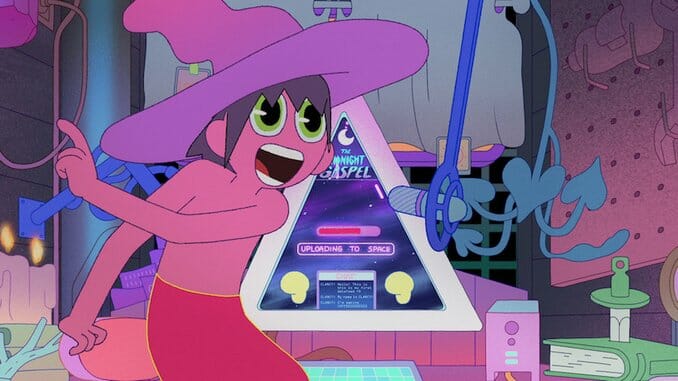Netflix’s The Midnight Gospel Turns “The Duncan Trussell Family Hour” into Psychedelic White Noise
Photo Courtesy of Netflix
The Midnight Gospel is less of a TV adaptation of introspective oddball comedian/podcaster Duncan Trussell’s work on The Duncan Trussell Family Hour than it is a collage featuring its audio. A melding of the minds between Adventure Time creator Pendleton Ward and Trussell, the show is Netflix’s latest foray into adult animation. I got to watch all eight episodes (premiering, of course, on Trussell’s own apropos birthday of 4/20) and it’s all about drug use, meditation, Buddhism, occultism, death, and other Big Topics that should serve as either warning or invitation to certain demographics. You likely already know which way you fall based on whether or not your eyes rolled. Complicating things, however, is the TV show trying to happen while all this is going on.
That’s not to say Trussell isn’t up for it. He’s an Adventure Time alum, voicing Ron James the potion dealer in that Cartoon Network classic, so his voice was already a match for Ward’s confetti-colored dreams. That gives his performance even more lackadaisical confidence as Clancy, a “spacecaster” that interviews … well, the same people Trussell interviews, only in the guise of various simulated weirdo aliens. It’s a laid-back performance that’s serene rather than lazy, with words tumbling out like an inebriated friend who enters into a fugue of clarity. But the format itself is the downfall.
The guest stars—everyone from Anne Lamott to Dr. Drew—don’t act like the alien deer-dogs or the president that they’re introduced as. They talk like themselves, about topics they’d normally be talking about. There are minor injections of dialogue to fit the animation, but on the whole, after an intro scene introduces the crazy sci-fi world (often the best part of the episode thanks to Phil Hendrie’s hilariously deadpan computer), you’re backdoored into a podcast episode played over an award-winning visualizer. Where Dr. Katz, Professional Therapist successfully repurposed stand-up routines for the therapist sofa, The Midnight Gospel fails to inject its deep talks into cosmic comedy.
There’s a clear intention for these juxtapositions to be thought-provoking, if not entertaining, but the end result is distraction. When there’s (mostly) compelling audio content experimentally paired with animation that’s directed well enough to be a silent short on its own merit—with a narrative that moves and flows independently of the discussion—the resulting cognitive dissonance dissolves all those pleasant parts into garbled brain static. It’s like if Drunk History faded out from its absolutely ham-sandwiched comedians, and the reenactment was a bunch of sci-fi gobbledegook. It’s a clash, but not a particularly funny tonal clash, like seeing George Washington burp and puke his way through a historical event.